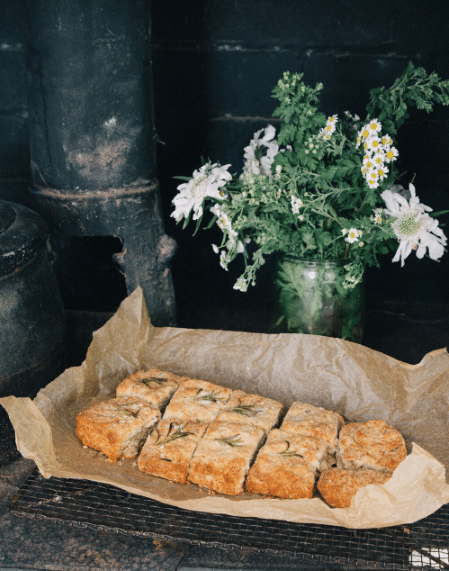Rosemary + Cheddar Scones

Makes 8–10
Use a vintage cheddar for a really cheesy scone, or swap it for tasty cheese if you like a smoother cheese flavour.
You can also rub the butter into the flour using your fingertips, if you prefer to be more hands-on—or, even better, get the kids to do it.
- 250g / 8.8oz buckwheat flour (you can also use spelt or plain flour)
- 1 tbsp baking powder
- pinch of salt
- 50g / 1.7oz cold butter, chopped into cubes
- 3 tsp finely chopped rosemary, plus a few extra sprigs for decoration
- 150ml / 1.7 fl oz milk
- 3/4 cup tasty or cheddar cheese, grated
- drizzle of olive oil
- pinch of salt flakes
- Preheat your oven to 200°C / 400°F / Gas Mark 6.
- Line a baking tray with baking paper.
- Place the flour, baking powder, salt, butter and rosemary into the bowl of a food processor, and process until the mixture resembles breadcrumbs.
- Add the milk and pulse once or twice until mostly combined.
- Add the grated cheese and pulse once more.
- Flour your benchtop with a little extra buckwheat flour.
- Tip the scone mixture onto the bench and press together roughly with your hands until the dough mostly sticks together and is rectangular in shape.
- Gently press the dough flat until is around 3cm – 4cm high.
- Dust a knife with a little buckwheat flour.
- Cut the dough into squares, making around 8–10 scones in all.
- Transfer the scones to the baking tray, keeping them close together and allowing them to touch.
- Press a rosemary sprig into the top of each scone.
- Drizzle the top of the scones lightly with olive oil, and sprinkle with a pinch of salt flakes.
- Bake the scones in the oven for 20–25 minutes, or until golden.
Without a Village
In the absence of a village, we are left to raise ourselves and our children, alone and at sea. An opinion piece by Tekie Quaye.
Night-time fears and what to do about them
Studies suggest that up to two-thirds of Australian kids are scared of the dark. Take a deep-dive into the why and how we can help.
How to Make Pikelets (and colour them naturally)
Like pancakes but only smaller, pikelets are the perfect snack for any time of day. Make them all the more fun (and a little bit healthier) by colouring them with fruits and veggies. Shh, don't tell the kids.




